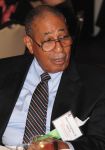At the 4th Annual Inclusive Voices community exchange luncheon, youth issues took center stage. Hosted by the Program to Aid Citizen Enterprise, the yearly event brings together some of Pittsburgh’s most influential leaders and voices.
“PACE was formed upon the assassination of (Rev. Dr.) Martin Luther King Jr. and the civil unrest that followed in our community. We noted some of the concerns youth had at two different points in time, but they remain critical issues today,” said Bob Nelkin, president of the United Way and who served as master of ceremonies. “You have the same opportunity today. You may have a wonderful conversation today and you may have a very powerful conversation.”
 |
| JUDGE LIVINGSTON JOHNSON
|
Although each table in the Omni William Penn grand ballroom March 30 veered in different topic directions, many found themselves discussing the direction today’s youth are headed in. Led by a group of 29 conversationalists, the guests also talked about issues like government, public safety and development.
“When I was on the bench from 1975 to 1985, marijuana was the primary drug I saw. But now it’s endemic,” said Livingstone Johnson retired Court of Common Please judge. “The other difference is in all of these children, I saw only two homicides. Now there are so many more.”
Reflecting on his years as a Pennsylvania judge, Johnson, who served as a conversationalist at one of the tables, said he has seen an increase in gun violence among youth. However, he also compared the Black and White parents who visited his courtroom to support their children.
“I saw a huge difference in the large number of Blacks who flooded my courtrooms compared to the number of Whites. I just tried to be even because if I was even, no White kid could come to my courtroom and say I was being prejudice,” Johnson said. “When the Black parents came in, they were all ready to let the government handle their kid. There wasn’t the issue of pride like the White parents. In the schools, if they have a Black kid in front of them, it’s expulsion. If it’s a White kid, they’re gonna call the home. This kind of discretion in the schools relates to the courtroom.”
Johnson’s table was made up of staff from Three Rivers Youth, a social service agency dealing with at-risk youth and struggling families. They were all too familiar with the troubled youth Johnson saw in his courtroom on a daily basis.
“I work with homeless teens and my issue with them is while they were homeless, they have committed a crime so how do we get that expunged because it may keep them from getting a job,” said Myra Powell, supervisor of health & human service programs. “What I hear from the young people is, ‘I’m not going to be able to get a job so I might as well stay in the streets.’”
While the guests discussed the legal troubles these children face, they also talked about the culture they live in and how this environment and the sometimes negative guidance of their parents has played a key role in pushing them toward trouble.
“Our parents today want to blame everyone but the kid. The parents can’t take responsibility so how can they teach responsibility,” Powell said. “Our kids have had some terrible things happen to them, things I don’t even know if I’d be able to make it through.”
They said a lot of what social services organizations are able to do is provide youth with hope, by showing them another way of life. As one of the event’s facilitator sponsors, Three Rivers Youth works with PACE to fulfill this mission
“I think too many of our young people don’t believe in themselves. Someone has to instill hope in them. There’s no respect of self. They get immune to (violence),” said Melva Hartzog, director of educational and transitional services, Three Rivers Youth. “It’s because of the environment they’re in. It’s about being able to show them there’s another way.”
PACE is a nonprofit organization formed more than 40 years ago through a partnership with the United Way of Allegheny County, the Health and Welfare Association, the Allegheny Conference on Community Development and key leaders in the African-American community. Their yearly event is an opportunity to spark dialogue and conversations between people with different experiences and serve as a catalyst for creativity and growth.
“I know there were a lot of spirited conversations going on,” said Fred Griffin, PACE commissioner and Inclusive Voices committee member. “Wasn’t this a great way to encourage the spirit of diversity in our community?”